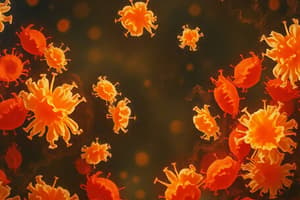Podcast
Questions and Answers
Where do antigen-presenting cells (APCs) display antigens for recognition by T cells?
Where do antigen-presenting cells (APCs) display antigens for recognition by T cells?
- In lymphoid organs (correct)
- In the bloodstream
- In the bone marrow
- In peripheral sites of infection
What is the main function of effector T lymphocytes at peripheral sites of infection?
What is the main function of effector T lymphocytes at peripheral sites of infection?
- Remain in lymphoid organs
- Secrete antibodies
- Capture antigens
- Eliminate infectious microbes (correct)
Where do plasma cells primarily remain to secrete antibodies?
Where do plasma cells primarily remain to secrete antibodies?
- In the bone marrow (correct)
- In lymphoid organs
- In the bloodstream
- In peripheral sites of infection
Where are naive lymphocytes primarily searching for foreign antigens?
Where are naive lymphocytes primarily searching for foreign antigens?
What is the main role of peripheral (secondary) lymphoid organs?
What is the main role of peripheral (secondary) lymphoid organs?
What is the primary function of antigen-presenting cells (APCs) with respect to microbes?
What is the primary function of antigen-presenting cells (APCs) with respect to microbes?
Where do effector T lymphocytes migrate to function in eliminating infectious microbes?
Where do effector T lymphocytes migrate to function in eliminating infectious microbes?
What distinguishes the functions of naive lymphocytes from effector T lymphocytes?
What distinguishes the functions of naive lymphocytes from effector T lymphocytes?
Flashcards are hidden until you start studying
Study Notes
Adaptive Immune System
- Comprises lymphocytes with diverse receptors specific to foreign substances.
- Antigens are molecules recognized by lymphocytes or antibodies.
Innate vs. Adaptive Immunity
- Innate immunity provides immediate defense against infections through mechanisms like epithelial barriers and phagocytes.
- Adaptive immune responses develop later, mediated by lymphocytes, with antibodies blocking infections and T lymphocytes targeting intracellular pathogens.
Immune System Cell Distribution
- Immune cells are located in various tissues and perform specific host defense roles.
- Most immune cells are derived from bone marrow and circulate in the blood as leukocytes (white blood cells).
Lymph Nodes
- Act as filters for lymph, where antigen-presenting cells (APCs) sample antigens from microbes.
- Dendritic cells transport antigens from epithelial tissues to lymph nodes, concentrating microbial antigens for immune responses.
Spleen
- A vascularized organ that processes blood-borne antigens similar to lymph nodes' role with lymph-borne antigens.
- Blood flows through a network of channels, allowing dendritic cells and macrophages to capture and concentrate antigens.
- Contains phagocytes that destroy microbes and old red blood cells.
Cutaneous and Mucosal Immune Systems
- Specialized lymphoid tissues and APCs are present in skin and mucosal barriers (gastrointestinal and respiratory tracts).
- Immune cells include Langerhans cells and intraepithelial lymphocytes in the cutaneous system, with organized collections like tonsils and Peyer patches in mucosal tissues.
Mucosal Immune System
- The mucosal immune system offers protection against microbial invasion, with mucus-secreting epithelium as a barrier.
- Specialized M cells transport antigens to underlying tissues; defenders include dendritic cells, T lymphocytes, and macrophages.
- Immunoglobulin A (IgA) is produced abundantly in mucosal tissues and neutralizes microbes.
Cellular Organization in Lymphoid Organs
- T and B lymphocytes are segregated in peripheral lymphoid organs.
- B cells are found in follicles at the cortex's periphery in lymph nodes, often featuring germinal centers after activation.
- T lymphocytes reside in the paracortex, adjacent to the B cell follicles.
Studying That Suits You
Use AI to generate personalized quizzes and flashcards to suit your learning preferences.




